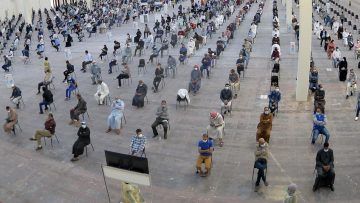Greg Miller in Science:

In response to the coronavirus pandemic, public health officials are asking us to do something that does not come naturally to our very social species: Stay away from each other. Such social distancing—avoiding large gatherings and close contact with others—is crucial for slowing the spread of the virus and preventing our health care system from getting overwhelmed. But it won’t be easy. “The coronavirus spreading around the world is calling on us to suppress our profoundly human and evolutionarily hard-wired impulses for connection: seeing our friends, getting together in groups, or touching each other,” says Nicholas Christakis, a social scientist and physician at Yale University.
And social distancing also tests the human capacity for cooperation, he adds. “Pandemics are an especially demanding test … because we are not just trying to protect people we know, but also people we do not know or even, possibly, care about.” The effects of short-term social distancing haven’t been well studied, but several researchers—most of them scrambling to deal with disruptions to their own lives because of the coronavirus—recently took time to share some thoughts with ScienceInsider on the potential social and psychological impacts, and how to mitigate them. Here’s what they said:
What’s known about the effects of social interaction on mental and physical health?
Over long periods of time, social isolation can increase the risk of a variety of health problems, including heart disease, depression, dementia, and even death. A 2015 meta-analysis of the scientific literature by Julianne Holt-Lunstad, a research psychologist at Brigham Young University, and colleagues determined that chronic social isolation increases the risk of mortality by 29%.
More here.
